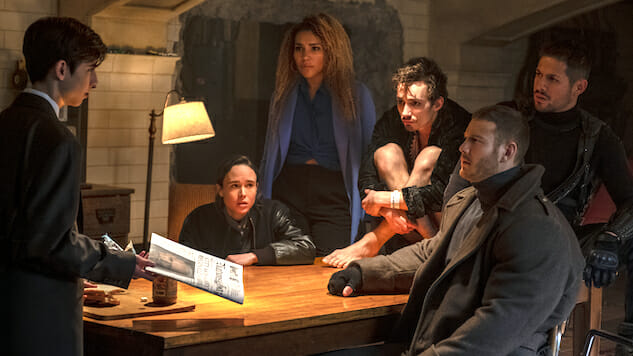The Umbrella Academy Points the Way Forward for Netflix Post-Marvel, One Needle Drop at a Time
Photo: Christos Kalohoridis/Netflix
About halfway through the first episode of Netflix’s The Umbrella Academy comes a moment of pure, unadulterated, sure-to-be-GIF’d joy: Five now-grown siblings—Tom Hopper’s brawny Luther; Ellen Page’s despondent Vanya; Emmy Raver-Lampman’s guilt-ridden Allison; David Castañeda’s hot-tempered Diego; and Robert Sheehan’s eccentric Klaus—each stop their own wallowing at various locations in their monstrous childhood home to celebrate the freedom they recently received thanks to the death of their oppressive adoptive father, Sir Reginald Hargreeves (played by Colm Feore).
How? Through interpretive dances to Tiffany’s brilliant 1987 cover of Ritchie Cordell’s “I Think We’re Alone Now.” Is this a strange way to process death? Sure. Is it amusing to watch? Definitely. Is it out of place in a series that also boasts an anthropomorphic chimpanzee as the family’s butler (voiced by Adam Godley, doing his best Alfred Pennyworth impression) and whose central plot—although there are several tangential ones—revolves around another brother (Aidan Gallagher’s Number Five) who disappeared as a teenager and comes back from the future to tell his siblings they must help him save the world? Or that assassins named Cha-Cha (Mary J. Blige) and Hazel (Mindhunter’s Cameron Britton), who take orders from an impeccably dressed handler (Kate Walsh), are out to find Five? Yep. Totally tracks.
And that’s before mentioning that these siblings all happen to have been born at the same time on the same day, to women who previously exhibited no signs of pregnancy, and were adopted in the hope that they would possess bizarre abilities and could be raised as a team of dynamic crime-fighters known as the Umbrella Academy. (Spoiler: Dad’s gamble pays off!)
“I love characters with foibles and dysfunction,” says Steve Blackman, who adapted the series from author Gerard Way and illustrator Gabriel Bá’s graphic novels, and whose credits include FX’s Legion, a series that this very outlet has described as “bat-shit crazy TV.” Blackman adds that he sees The Umbrella Academy as a “dysfunctional family show”: “Having super powers was somewhat incidental,” because the series is more akin in his mind to The Big Chill, in which an ensemble of scattered characters are drawn back together.
The series, like the books, also toys with stereotypes. For example, Luther is called Number One by his father and, being a tall, cisgender, straight, white guy, might be assumed to be the group’s leader. He’s not, a fact that is not lost on Hopper. “In this day and age,” he says, “it’s important to show that it’s not the dominant white male.” For another, Klaus is a drug addict with a flair for the dramatic—a trait linked in the series not to his sexuality (he’s queer), but to the fact that he sees dead people and needs to silence the voices in his head. Sheehan says it’s his “dreadful fear” that people might not recognize this. When the character sobers up in later episodes, he notes, “the absence of drugs and alcohol really grounds him and makes him less performative.”
-

-

-

-

-

-

-

-

-

-

-

-

-

-

-

-

-

-

-

-

-

-

-

-

-

-

-

-

-

-

-

-

-

-

-

-

-

-

-

-








































